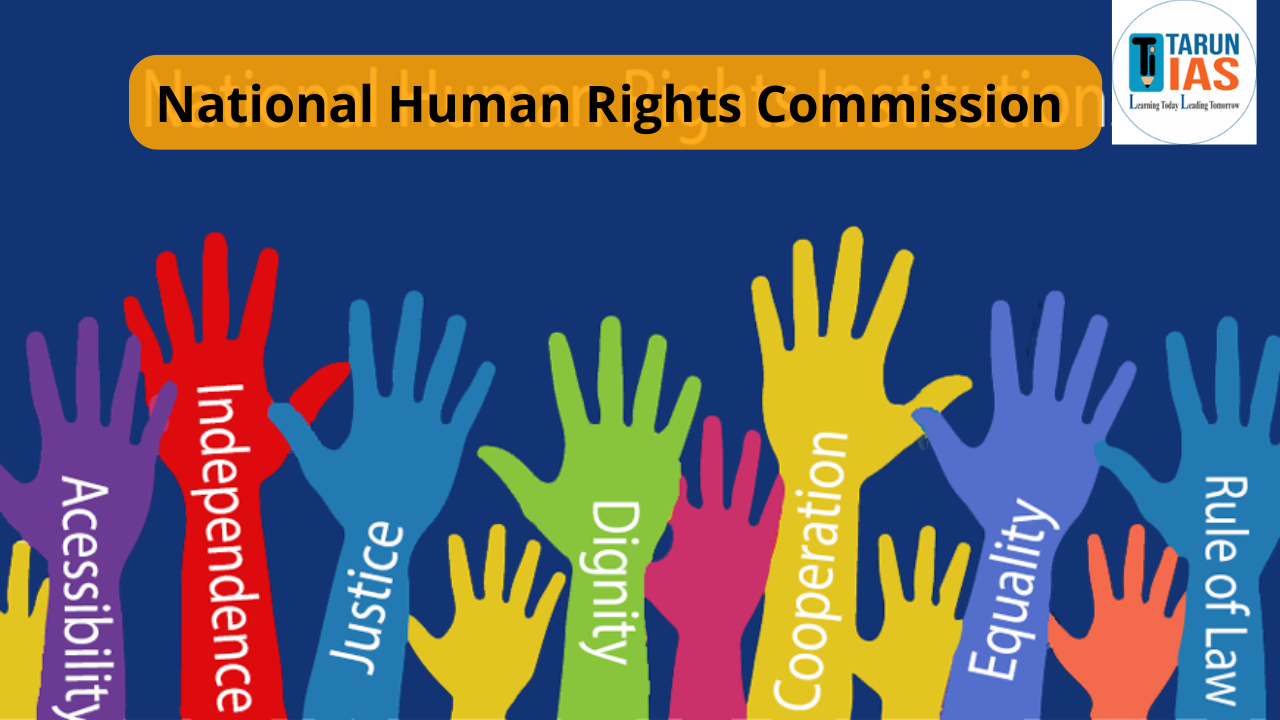National Human Rights Commission Introduction
- The National Human Rights Commission (NHRC) of India plays a pivotal role in safeguarding human rights across the nation.
- Established under the Protection of Human Rights Act, 1993, the NHRC serves as the country’s official watchdog for human rights, tasked with investigating complaints, ensuring human rights are respected, and guiding the government on critical human rights issues.

What is the NHRC?
- The National Human Rights Commission (NHRC) of India was established on 12 October, 1993.
- It is an independent statutory body.
- The NHRC is a multi-member body, consisting of a Chairperson and five members, each appointed by the President of India based on recommendations from a six-member selection committee. This committee includes the Prime Minister (Chairperson), the Speaker of the Lok Sabha, the Deputy Chairman of the Rajya Sabha, and Leaders of the Opposition in both Houses of Parliament, along with the Home Minister.
- The Chairperson is a retired Chief Justice of India or a Supreme Court judge, while the members include one from the Supreme Court, one from the Chief Justices of High Courts, and three others with significant experience in human rights issues, one of whom must be a woman.
Mandate of NHRC
- Investigation: NHRC investigates complaints related to human rights violations either suo-motu or based on petitions.
- Prevention and Safeguard: The Commission monitors the conditions of prisoners and recommends improvements in line with human rights standards.
- Intervention: NHRC can intervene in court proceedings related to human rights violations with the approval of the court.
- Human Rights Awareness: NHRC runs awareness campaigns to educate the public about their human rights and the safeguards available.
- Review and Recommendations: The Commission reviews factors such as terrorism and social issues that inhibit the enjoyment of human rights and suggests remedial measures.
Human Rights Protection Provisions in India
- Universal Declaration of Human Rights (UDHR) principles have been embraced by India.
- Right to Equality (Articles 14-18) guarantees equality before the law, prohibits discrimination, and abolishes untouchability.
- Right to Freedom (Articles 19-22) ensures various freedoms such as speech, movement, and the right to life and liberty.
- Right Against Exploitation (Articles 23-24) prohibits forced and child labour.
- Right to Life (Article 21) has been interpreted by the Supreme Court to mean a life of dignity, as reflected in Bandhua Mukti Morcha v. Union of India (1984).
Successes of NHRC
- HIV/AIDS Awareness Campaigns: NHRC has been at the forefront of advocating for the rights of people living with HIV, reducing stigma and promoting healthcare access.
- Intervention in Child Sexual Abuse Cases: The NHRC intervened in high-profile cases such as the Nithari Village case in Noida, where several children were murdered.
- Suo-motu Action in Police Excesses: NHRC took suo-motu action after 10 people were killed in police firing during the Anti-Sterlite protests in Tuticorin, Tamil Nadu.
- Support for Media Rights: The NHRC intervened in the tragic murder of Shujaat Bukhari, the editor of Rising Kashmir, in a bid to protect journalists and media practitioners in the region.
Failures of NHRC in Human Rights Protection
- Custodial Torture and Extrajudicial Killings: High-profile cases like the Sathankulam custodial deaths in Tamil Nadu highlight the ongoing issue of custodial violence and extrajudicial killings in India.
- Gender-based Violence: Violence against women, including rape, sexual abuse, and domestic violence, remains widespread, and NHRC has struggled to bring about significant change.
- Manual Scavenging: Despite legal measures, the practice of manual scavenging continues to persist, with over 26 lakh insanitary latrines recorded in the 2011 Census.
- International Setbacks: NHRC faced a major blow when it was suspended for two consecutive years (2023 and 2024) by the Global Alliance of National Human Rights Institutions (GANHRI), impacting its international credibility.
Challenges Faced by NHRC
- Recommendatory Nature: As a recommendatory body, NHRC cannot enforce its decisions, meaning its recommendations are often disregarded by authorities.
- Limited Investigative Powers: NHRC lacks an independent investigative body and cannot pursue complaints made more than one year after the incident, leaving many grievances unresolved.
- Jurisdictional Restrictions: NHRC cannot address violations by private individuals and has limited jurisdiction over violations involving the armed forces.
- Political Influence: The post-retirement appointments of judges and bureaucrats to the NHRC have raised concerns over political influence and the impartiality of its decisions.
- Resource Constraints: Inadequate funding and insufficient staff have hindered NHRC’s operational capacity and effectiveness.
Way Forward
- Enforcement of Recommendations: NHRC’s decisions should be legally enforceable, giving it the authority to ensure that its recommendations are implemented by the government.
- Revamping the Membership Structure: The Commission’s membership should be broadened to include civil society members, human rights activists, and representatives from marginalized communities, rather than relying solely on judicial appointees.
- Independent Investigative Staff: NHRC should recruit its own independent investigative staff, eliminating the current practice of deputation from other government departments, ensuring impartiality in investigations.
- Developing a Tailored Human Rights Framework: NHRC should create a scientific human rights framework specifically tailored to India’s socio-political context, addressing issues such as caste-based discrimination, gender inequality, and economic exploitation.
- Expanding Public Awareness: NHRC should continue to educate citizens about their rights and the safeguards available, especially in rural and marginalized areas. This can be achieved through media campaigns, seminars, and community outreach programs.















